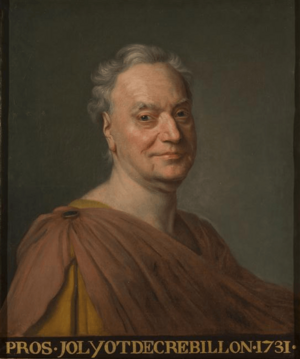Prosper Jolyot de Crébillon facts for kids
Prosper Jolyot de Crébillon (born January 13, 1674 – died June 17, 1762) was a famous French poet and writer of tragedies. He wrote plays that were often sad and serious, focusing on big emotions and important historical events.
Contents
A Young Writer's Start
Prosper Jolyot de Crébillon was born in Dijon, France. His father, Melchior Jolyot, worked as a royal notary, which was a legal job. Crébillon went to a Jesuit school in Dijon. Later, he studied at the Collège Mazarin in Paris.
He first trained to be a lawyer, also called an advocate. He worked in a law office in Paris. His boss encouraged him to write plays. Crébillon wrote a play called Mort des enfants de Brutus, but it was never performed.
His Famous Plays
Crébillon had his first success in 1705 with a play called Idoménée. Two years later, in 1707, his play Atrée et Thyeste was performed many times for the royal court.
In 1709, he wrote Electre. Then, in 1711, he created what many consider his best play, Rhadamiste et Zénobie. Even though its story was a bit complicated, it was very popular. However, his next plays, Xerxes (1714) and Sémiramis (1717), were not as successful.
Life's Challenges
In 1707, Crébillon married a girl who did not have much money. Sadly, she passed away, leaving him with two young children. Around the same time, his father also died, leaving no money.
Crébillon faced tough times and felt very sad. He moved to a small attic room. There, he surrounded himself with many animals like dogs, cats, and birds, which he loved. He found comfort in their company during this difficult period.
Return to Success
Crébillon made a comeback to the stage in 1726 with a successful play called Pyrrhus. His talent was recognized again.
In 1731, even after spending a long time away from public life, he was chosen to join the Académie française. This is a very important group that protects the French language. In 1735, he became a royal censor, which meant he reviewed books and plays. In 1745, a powerful woman named Madame de Pompadour gave him a good pension and a job in the royal library.
In 1748, his play Catilina was a big hit at court. When he was 80 years old, in 1754, he presented his last tragedy, Le Triumvirat. Crébillon's only son, Claude, also became a writer.
Rivalry and Legacy
Many people thought Crébillon was a better tragedy writer than Voltaire, another famous French writer. Because of this friendly competition, Voltaire even wrote plays on the same topics as five of Crébillon's tragedies.
After Crébillon died in 1762, a writing called Éloge de Crébillon (which meant "Praise of Crébillon") appeared. Many believed Voltaire wrote it, even though he said he didn't.
Crébillon's works have been published many times. Some important collections include Œuvres (1772) and Théâtre complet (1885). His life and plays are also studied in books like Maurice Dutrait's Étude sur la vie et le théâtre de Crébillon (1895).
His writing even influenced other famous authors. For example, Edgar Allan Poe used lines from Crébillon’s play Atrée in the ending of his story "The Purloined Letter."
See also
 In Spanish: Prosper Jolyot de Crébillon para niños
In Spanish: Prosper Jolyot de Crébillon para niños
 | Stephanie Wilson |
 | Charles Bolden |
 | Ronald McNair |
 | Frederick D. Gregory |


